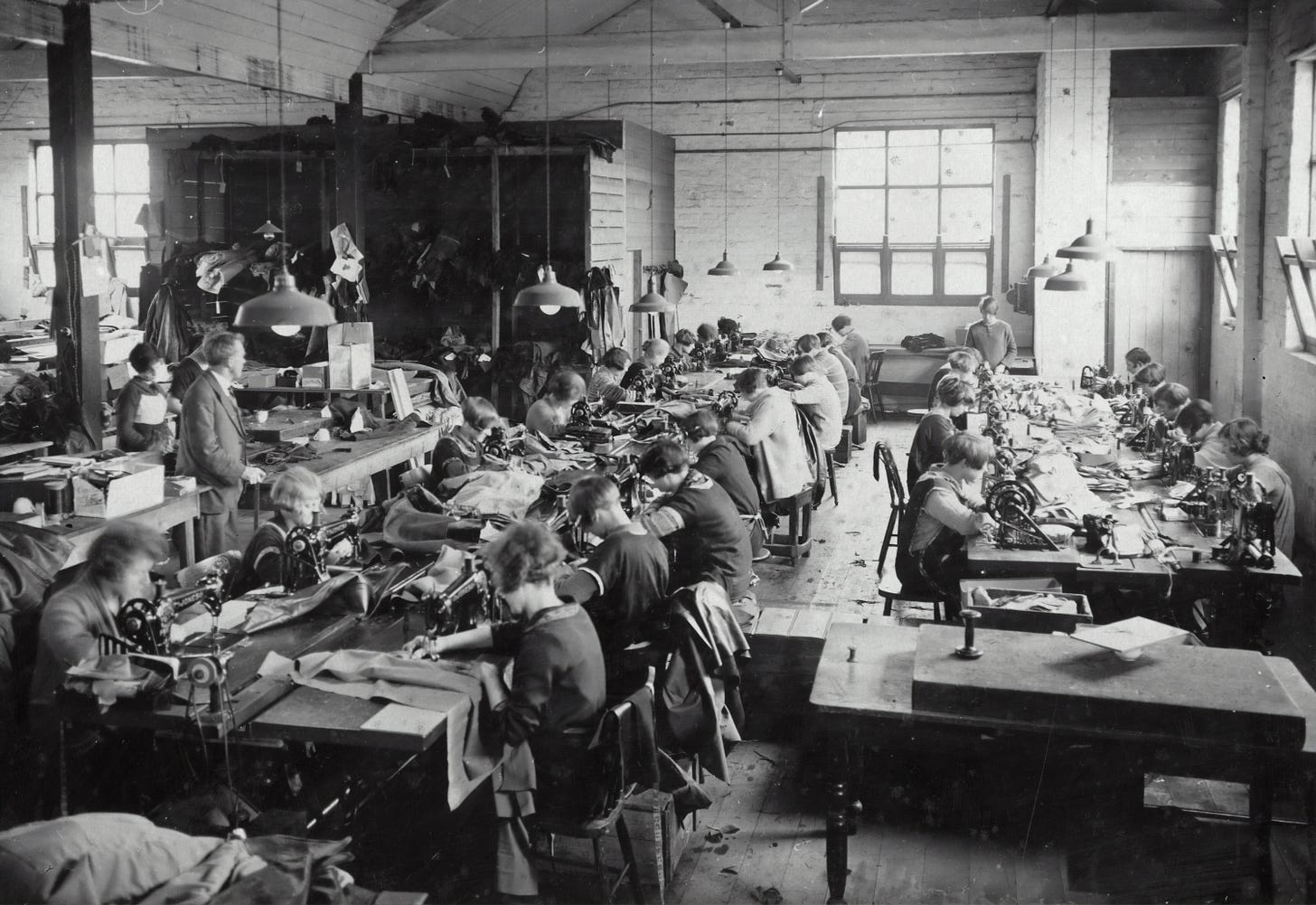Standing on the corner of the Long & Less Traveled Road & the Highway to Nowhere
In the Great Resignation, the historical and the future reconnaissance in the disruptive reconstruction of a better world to come.
The Industrial Revolution is the matrix of discontent that connects several seemingly disparate historical movements that reacted against the large industrial factories that eventually morphed into the corporate world order, dividing the entire world into developed and developing nations, and low-income and high-income labor markets, countries, and people that produce things, and countries and people that have passive incomes.
Karl Marx, the Luddites, the Arts and Crafts movement, midcentury designers, Andersen Design (author’s historical background), Andy Warhol (in an odd sort of way), and remote working are among the evolution of the counter-culture resistance to dehumanization of work that proliferated in the factories of the Industrial Revolution.
The human industrial revolution has been evolving since the beginning of civilization but the period that is known as “the Industrial Revolution” is particularly marked by its dehumanization of the work process, whereas other advances in industrialization humanized work, for example, the wheel, made the transportation of things easier and more humane for the carrier.
The Great Resignation is a contemporary voice expressing a long and evolving historical-cultural response to the Industrial Revolution. Since the nineteenth century, the push-back to the Industrial Revolution has been from alternate cultural movements but current momentum and proportion categorizes the push-back against hierarchal corporatism as a mainstream movement.
The Industrial Revolution is moving toward automation, decreasing the corporate need for human labor. If transformations in other areas are not calibrated toward a correspondingly new social order, automated production will disproportionately benefit the owners of the means of production and intellectual property over all others, particularly over people who work for a living.
The Industrial Revolution displaced the era of cottage industries by taking the workers out of their homes and into the factories but the future of conventional factory production is toward less human labor and more automation.
The current thinking within the established system rationalizes dehumanization as if placing a series of mirrors strategically angled to reflect and confuse the public, proclaiming a new norm exemplified as a homeless shelter located in an industrial zone, while businesses in a home must be broken apart, with the business, minus the residence, moved to an industrial zone.
The rationale behind categorizing a homeless shelter as appropriate for an industrial economic development zone has nothing to do with the primary and public function of providing shelter for the homeless. The shelter creates jobs and enriches investors incidentally. The incidental functions, not the primary function of a homeless shelter qualify a homeless shelter as an industrial purpose and subsequently qualify it for opportunity zone financing.
All in all, the political gestalt expressed through a 200-bed homeless shelter in an industrial zone, situated by a major highway, allows the most forlorn and disadvantaged in society to be used to advantage the wealthiest reflecting the moral heart of the great wealth divide. This gestalt continues up the social ladder with human beings used as instruments of the economic development of others, all the way up the hierarchy.

The political gestalt that manifested a 200-bed homeless shelter in an industrial zone is codified into Maine law in the purpose statement of the Financial Authority of Maine corporation.
FAME Inc was chartered by a special act of legislation to serve as the depository of concentrated wealth to be distributed by the state. through the Department of Economic and Community Development.
The FAME Corporation
§969-A. Powers and duties of the authority
14-A. Receive funds. Receive and accept from any source allocations, appropriations, loans, grants and contributions of money or other things of value to be held, used or applied to carry out this chapter, subject to the conditions upon which the loans, grants and contributions may be made, including, but not limited to, appropriations, allocations, loans, grants or gifts from any federal agency or governmental subdivision or the State and its agencies. ….[1991,c. 780,Pt. P,§1(AMD).]
That paragraph covers a lot of loose territories- another black hole where the public meets the private anything goes! The chapter is to be liberally construed.
It can be argued that the FAME corporation is a violation of Article IV Part Third Sections 13 &14 of the Maine Constitution, which forbids the Maine Legislature from chartering corporations by special acts of legislation, excepting municipal purposes and if the object of the corporation cannot be achieved another way (as in the private sector).
The same argument applies to the attempts by some in the Maine Legislature to charter a state-owned electric utility corporation. If that act passes, the legally contested domino effect could reach the FAME corporation, which would make for interesting times.
The Financial Authority of Maine corporate charter:
§962. Purpose
The authority will serve a public purpose and perform an essential governmental function in the exercise of the powers and duties conferred upon it by this chapter. Any benefits accruing to private individuals or associations, as a result of the activities of the authority, are deemed by the Legislature to be incidental to the public purposes to be achieved by the implementation of this chapter. [1985, c. 344, §5 (AMD).] (emphasis by author)
The idea that the authority will serve a public purpose justifies the benefits going incidentally to private interests. The public purpose of a homeless shelter does not qualify it as an industrial (economic development) function and so private incidental purposes are used to qualify the homeless shelter for economic development opportunity zone tax shelters, which incidentally benefits, not the public nor the homeless, but private individuals and associations. Which is the essential government function and which is incidental to it?
To qualify as an economic development opportunity zone by the primary and public function of a homeless shelter, the shelter must at minimum provide its inhabitants an environment for restful sleep, a basic need that an economic development resource must provide to a homeless person to increase their economic development prospects. That’s just common humanitarian cents (pun intended).
The 200 plus homeless shelter fails to provide an environment for restful sleep and so in its primary and public function, it does not qualify as an economic development opportunity zone.
Concentrating wealth for the benefit of those who live on passive incomes
A short timeline shows how the incidental benefits drive the “public benefit “(such as a homeless warehouse in an industrial zone)
Finance Authority of Maine Agrees to Partner With Arctaris Impact to Help Attract Opportunity Zone Capital to Local Investments
Directs Investments into Economic and Community Development Projects in Maine
July 10, 2019
BOSTON--(BUSINESS WIRE)--Arctaris Impact Investors, LLC (Arctaris), a leading impact investment fund manager, today announced that the Finance Authority of Maine (FAME) has agreed in principle to provide up to $10 million in guarantees to Arctaris under its commercial loan insurance program to support Opportunity Zone investments in Maine.
MAY 24, 2021
Uche Osuji, Managing Director at Arctaris Impact Investors, Joins CEI Ventures’ Board Of Directors
May 24, 2021 (Brunswick, ME)–CEI Ventures, Inc., the Brunswick, Maine-based impact venture capital firm, announced the addition of a new Board Member, Uche Osuji. Osuji is a Managing Director at Arctaris Impact Investors, LLC, a privately-held investment firm that invests in growth-oriented operating businesses and infrastructure projects located in underserved communities.
Water, water, everywhere and not a drop to drink!

Across the arc of history, the nineteenth-century Luddites join in solidarity with the twenty-first century Great Resignation. It took only 200 years for the mainstream to meet on the off-stream! But here we are! It’s real because we are at a watershed moment in history. It’s not the age of the Industrial Revolution anymore. It’s the digital age and the automated age. The ground is shifting under our feet.
What’s the best course of action when the world around us is shaken up? Trust it. Go with the flow. In an accident, there is a better chance of survival in a relaxed state.
On early digital age social media sites like Facebook, some say “the workers will return to work because they have to”, implying that workers have no other choice but to go along with the program.
Later digital age platforms like Medium provide a new monetized format for the voice of the people where corporate culture as seen through the eyes of the workforce differs starkly from the branding. The new monetized social media format is at once a venue for airing complaints and a potential exit from the road to nowhere. Currently stories about making money and going viral obscure everything else, encouraging newcomers to produce even more stories around the same topics so they can develop a successful side gig that can free them from the yoke of corporatism. Recently Medium added a function that selects “Show less of these kinds of stories”. It helps but is limited by AI, which can’t understand that less means less. Click on one of those kinds of story and they return en masse flooding the entire headspace.
When the flood is managed, one can see stories about other topics. The workforce relays personal stories of corporate culture as an unhealthy hierarchical social structure that by itself accounts for why a majority of office workers want to continue as remote workers. They have discovered that they are more productive in less time away from the distractions of the corporate environment. That realization takes out the base belief that workers have no other choice but to return to their jobs at corporate headquarters.
The paradigm embraced for decades by the public-private state, positioned investors and private owners of the means of productions as public benefactors providing “quality jobs” for the workforce. Coronavirus allowed the workforce enough time away from corporate culture to evoke a spontaneous, synchronistic, en masse realization and reaction that made perfectly apparent that the corporate culture needs the workforce to create profits for the top of the hierarchy.
Considering that the definition of “quality jobs” was measured by the public-private state solely in terms of jobs that create higher than average wages and benefits (on the backs of the rest of the economy), revealing the spiritually bankrupt heart of the system, that apple was a hard sell. Even the few benefiting from those quality jobs require special interest trusts to build “affordable workforce housing”, which is a lower standard of living than that provided by current low-income housing in Maine.
The momentous evolution of the wealth divide is escalating at an ever-faster rate dissolving the shades of rhetoric that obscured the big lie at its heart.
The culture of corporatism was built on the idea that large-scale corporate culture would provide financial security and a comfortable retirement but as corporatism expanded through the public-private-for-profit-nonprofit industrial complex, so did the wealth divide.
The wealth divide has been expanding for so long that we can see where it has been and where it is going. For those not at the top of the hierarchy, it is the road to nowhere.
The collapse of the belief that homeownership is accessible, accompanied by a progressive reduction in the size of living spaces across all classes is a huge wake-up call. Traveling further on down the same road is not worth the trip. Coronavirus opened up horizons of new mental, physical and spiritual spaces. People everywhere had time and space to listen to themselves.
If one feels the road traveled leads to nowhere, there is nothing to lose in trying another, even if one is not sure where the new road leads. Hope matters. Follow the hope!








I get your points. It seems that I am so far out in the margins, I don't have to make any effort to have a different voice. Works okay for the half-dozen or so who read it. I kept up a blog on Wordpress for several years, now I just pay them an annual fee to archive my material. All blogging platforms seem to work that way.
Search algorithms annoy the hell out of me. So does spell-check. Running battle against AI… as Michael Pollan says of the groundhog, "you may be smarter, he has more time."
Context: I learned the succession of English monarchy because I was interested in furniture styles. That timeline eventually helped me to understand architectural periods, art history, and social and political history. We don't have a shred of "common ground" in the South, because the southern colonies were developed under 18th c. English laws, while your northern colonies were created in the 17th c. That's why I keep recommending Hammond. A lot of our political woes begin with Enclosure.
Two massive financial bubbles, the South Sea Company, and the Mississippi land trade, collapsed simultaneously in July 1720. One led to enclosure, and the industrial revolution; the other to the French Revolution. By all means, tie your story to a deeper history.
HCR teaches history at Boston College, and has been writing a daily "letter" on the current political landscape. Delightfully well researched and well written. She just happens to be married to a lobsterman in Maine.
Please, don't take that as criticism. I skim through a lot of reading, if it doesn't grab my attention or if its poorly written (grammar, syntax, logic...) I don't stick. Writing is craft. I'm on your side.